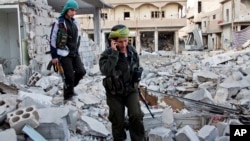It has been an uneasy year since Kobani, a border town in northern Syria, was liberated from the Islamic State group.
The liberation of the city was hailed as the first successful case of cooperation between the Western coalition, whose fierce airstrikes helped drive IS from the city, and Kurdish fighters, who pushed IS militants out on the ground.
But the slow recovery also shows how difficult it will be for cities in Iraq and Syria to return to normal life after they have been occupied and controlled by IS.
The air assault and four months of fierce fighting left the town of nearly 300,000 inhabitants in ruins.
Returning refugees came back with determination to rebuild even though most of the city's homes – as many as 80 percent -- were in ruins.
“Living in a tent was a humiliation,” a still fearful resident who spent months in a refugee camp in Turkey told VOA. “I chose to come back, despite knowing life would be tougher here.”
Soon after the liberation, a local commission was formed to help rebuild Kobani. In July, an international conference was held at the European Union offices in Brussels to discuss the rebuilding of Kobani and ways to aid the city.
Officials, however, complain that assistance from international donors has yet to be delivered.
"Unfortunately، no government or international body has so far stepped in to help us in our efforts,” said Choman Kaanani, who heads the engineers association in Kobani.
“Most [of the help] we receive is from non-governmental organizations and private Kurdish citizens. But this not enough to rebuild Kobani,” he said.
The private donations from organizations in the U.S., Europe and other parts of the world have made a difference in securing basic needs.
“Until now we have actually restored up to 80 percent of electricity in Kobani,” Hawzhin Azizi, a member of the Kobani Reconstruction Commission, told VOA. “We have also built two large bakeries to supply bread to much of the city.”
Inadequate services have hindered the return of many refugees to their homes. An estimated 50,000 people - 15 percent of the pre-war population - have made it back home
Refugees are unhappy with the slow pace of the rebuilding process.
“I don’t know how long this will take. My children have not been in school since we fled Kobani,” said Jamal Hamid, a father of four children, in a telephone interview with VOA.
Living in a refugee camp across the border in Turkey, Hamid said his return to Kobani might take longer than what he and his family expected.
“Even if we decide to go back [to Kobani], there will be no place for us to stay – much less for my children to be able to go back to school,” he said.
Further complicating matters is the fact that the only border crossing between Kobani and Turkey has been shut for the past three months. This has halted many ongoing projects in the city, local officials say.
The border shutdown has also affected the lives of ordinary people in Kobani, who heavily rely on goods coming from Turkey. Consequently, prices of food staples and other products have skyrocketed.
Locals say they now get most of their food staples from other Kurdish areas where agricultural products are relatively abundant. But this is risky, as IS militants control some areas between the various Kurdish regions in Syria.
On the security front, Kurdish forces have maintained a strong grip on the city.
Save for an attack in June 2015 in which more than 50 civilians were killed by IS militants who infiltrated the city, Kurds have largely been able to keep IS at bay.
Kurdish officials are encouraging more refugees to return.
“Daesh [IS] is no longer a stronger force. They have lost a lot of ground to our [Kurdish] forces... the threat to Kobani no longer exists,” said Ismat Sheikh Hasan, head of the defense commission in Kobani’s regional administration.
“Now it’s time for the free world to help us rebuild the city the same way they helped us liberate [it] from those [IS] thugs,” Hasan said.




